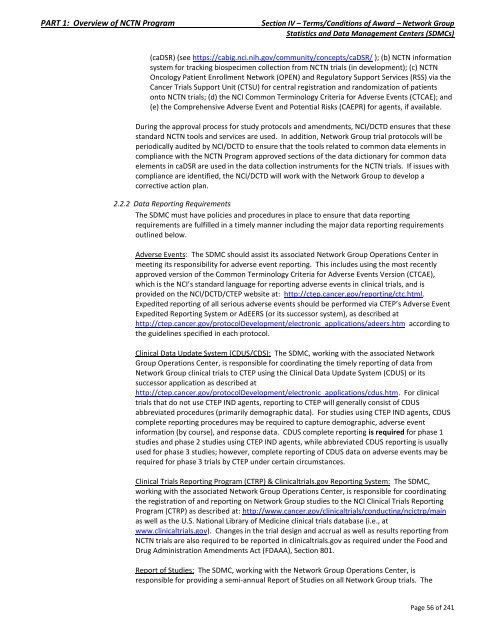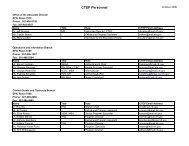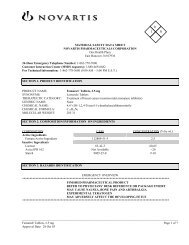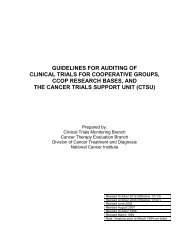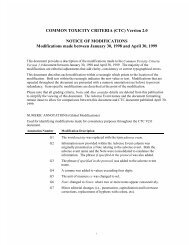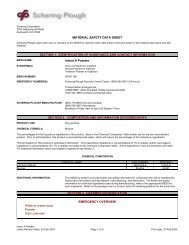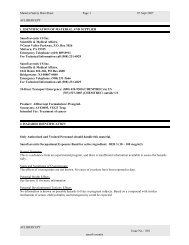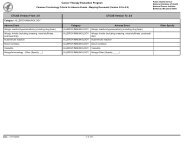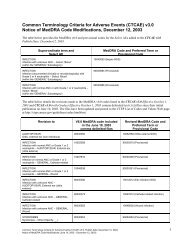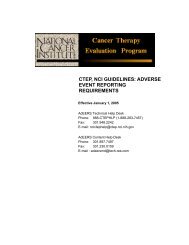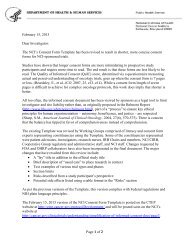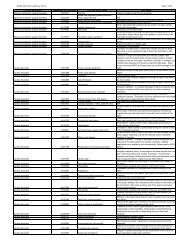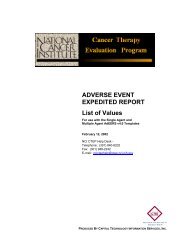NCI National Clinical Trials Network (NCTN) Program Guidelines
NCI National Clinical Trials Network (NCTN) Program Guidelines
NCI National Clinical Trials Network (NCTN) Program Guidelines
Create successful ePaper yourself
Turn your PDF publications into a flip-book with our unique Google optimized e-Paper software.
PART 1: Overview of <strong>NCTN</strong> <strong>Program</strong> Section IV – Terms/Conditions of Award – <strong>Network</strong> Group<br />
Statistics and Data Management Centers (SDMCs)<br />
(caDSR) (see https://cabig.nci.nih.gov/community/concepts/caDSR/ ); (b) <strong>NCTN</strong> information<br />
system for tracking biospecimen collection from <strong>NCTN</strong> trials (in development); (c) <strong>NCTN</strong><br />
Oncology Patient Enrollment <strong>Network</strong> (OPEN) and Regulatory Support Services (RSS) via the<br />
Cancer <strong>Trials</strong> Support Unit (CTSU) for central registration and randomization of patients<br />
onto <strong>NCTN</strong> trials; (d) the <strong>NCI</strong> Common Terminology Criteria for Adverse Events (CTCAE); and<br />
(e) the Comprehensive Adverse Event and Potential Risks (CAEPR) for agents, if available.<br />
During the approval process for study protocols and amendments, <strong>NCI</strong>/DCTD ensures that these<br />
standard <strong>NCTN</strong> tools and services are used. In addition, <strong>Network</strong> Group trial protocols will be<br />
periodically audited by <strong>NCI</strong>/DCTD to ensure that the tools related to common data elements in<br />
compliance with the <strong>NCTN</strong> <strong>Program</strong> approved sections of the data dictionary for common data<br />
elements in caDSR are used in the data collection instruments for the <strong>NCTN</strong> trials. If issues with<br />
compliance are identified, the <strong>NCI</strong>/DCTD will work with the <strong>Network</strong> Group to develop a<br />
corrective action plan.<br />
2.2.2 Data Reporting Requirements<br />
The SDMC must have policies and procedures in place to ensure that data reporting<br />
requirements are fulfilled in a timely manner including the major data reporting requirements<br />
outlined below.<br />
Adverse Events: The SDMC should assist its associated <strong>Network</strong> Group Operations Center in<br />
meeting its responsibility for adverse event reporting. This includes using the most recently<br />
approved version of the Common Terminology Criteria for Adverse Events Version (CTCAE),<br />
which is the <strong>NCI</strong>’s standard language for reporting adverse events in clinical trials, and is<br />
provided on the <strong>NCI</strong>/DCTD/CTEP website at: http://ctep.cancer.gov/reporting/ctc.html.<br />
Expedited reporting of all serious adverse events should be performed via CTEP’s Adverse Event<br />
Expedited Reporting System or AdEERS (or its successor system), as described at<br />
http://ctep.cancer.gov/protocolDevelopment/electronic_applications/adeers.htm according to<br />
the guidelines specified in each protocol.<br />
<strong>Clinical</strong> Data Update System (CDUS/CDS): The SDMC, working with the associated <strong>Network</strong><br />
Group Operations Center, is responsible for coordinating the timely reporting of data from<br />
<strong>Network</strong> Group clinical trials to CTEP using the <strong>Clinical</strong> Data Update System (CDUS) or its<br />
successor application as described at<br />
http://ctep.cancer.gov/protocolDevelopment/electronic_applications/cdus.htm. For clinical<br />
trials that do not use CTEP IND agents, reporting to CTEP will generally consist of CDUS<br />
abbreviated procedures (primarily demographic data). For studies using CTEP IND agents, CDUS<br />
complete reporting procedures may be required to capture demographic, adverse event<br />
information (by course), and response data. CDUS complete reporting is required for phase 1<br />
studies and phase 2 studies using CTEP IND agents, while abbreviated CDUS reporting is usually<br />
used for phase 3 studies; however, complete reporting of CDUS data on adverse events may be<br />
required for phase 3 trials by CTEP under certain circumstances.<br />
<strong>Clinical</strong> <strong>Trials</strong> Reporting <strong>Program</strong> (CTRP) & <strong>Clinical</strong>trials.gov Reporting System: The SDMC,<br />
working with the associated <strong>Network</strong> Group Operations Center, is responsible for coordinating<br />
the registration of and reporting on <strong>Network</strong> Group studies to the <strong>NCI</strong> <strong>Clinical</strong> <strong>Trials</strong> Reporting<br />
<strong>Program</strong> (CTRP) as described at: http://www.cancer.gov/clinicaltrials/conducting/ncictrp/main<br />
as well as the U.S. <strong>National</strong> Library of Medicine clinical trials database (i.e., at<br />
www.clinicaltrials.gov). Changes in the trial design and accrual as well as results reporting from<br />
<strong>NCTN</strong> trials are also required to be reported in clinicaltrials.gov as required under the Food and<br />
Drug Administration Amendments Act (FDAAA), Section 801.<br />
Report of Studies: The SDMC, working with the <strong>Network</strong> Group Operations Center, is<br />
responsible for providing a semi-annual Report of Studies on all <strong>Network</strong> Group trials. The<br />
Page 56 of 241


